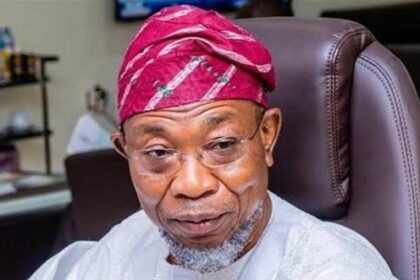*The Gatekeeper of Power: Khadijatou Wouro Ba’s Silent Force Behind Kwara Throne
*How She Attained Enigmatic Sway in Governor AbdulRazaq’s Court
*Between Rumors, Legends, and the Reality of Ba’s Influence
There is a story doing the rounds in Kwara State government circuit. That Khadijatou Wouro Ba exerts a tenacious grip on the kitchen cabinet and administration of Governor AbdulRahman AbdulRazaq.
An air of intrigue lingers in the wake of her emergence in the state’s corridors of power, like a woman whose influence is as remarkable as it is understated. Wouro Ba, a Senegalese lady of dignified poise, commands an authority that few, if any, dare to challenge. For many in Kwara, her word is law; her approval, a royal decree.
There is no gainsaying she is the keeper of the gates, the pulse within the political heart of Kwara. In a realm where men traditionally lead, Wouro Ba has carved a place of unrivaled power and mystique, becoming the unseen force behind Governor AbdulRahman AbdulRazaq’s administration. Hers is a quiet power, yet it reverberates through every decision, every contract, and every ambition seeking a voice in Kwara’s political orchestra.
To behold Ba in action, one must first pass through layers of mystery. Few see her regularly; fewer still can claim her ear. To the untrained eye, she may seem an unlikely architect of Kwara’s political fate, yet Ba’s understated presence belies her formidable influence. As the principal private secretary to Governor AbdulRazaq, she transcends her official title, shaping policies and movements with a power most advisors can only dream of wielding.
From afar, her office appears calm, yet it is a sacred ground where Kwara’s most prominent figures gather in humble anticipation, awaiting an audience. They say that the true seat of authority lies not in the governor’s chair but in the unseen hand that guides it. For the privileged few granted her audience, there is an unspoken reverence, an acknowledgement of her role as the keeper of the keys, the one who shapes Kwara’s destiny with a measured nod or subtle whisper.
Those who seek power within Kwara State’s administration know that all roads lead to Ba. Her influence has given rise to a culture of adulation that skirts the boundary between respect and fear. Contract seekers and aspiring appointees alike find themselves in a delicate dance, as approaching her requires more than mere entitlement—it demands tact, patience, and a reverence for her approval.
This silent hierarchy around Ba has become Kwara’s well-known, unspoken rule. Like a royal court, the hierarchy reverberates with whispers of her influence. The sheer gravity of her presence has shaped the governor’s cabinet, her role both a bridge and a barrier to those who wish to rise within its ranks. To speak of Ba in Kwara is to recognize an extraordinary woman in a male-dominated world who has cultivated a power few can emulate. But as with all positions of immense authority, her role inspires both admiration and unease among those who witness it.
To those who seek fortune within Kwara, Ba’s office is both a gate and a gatekeeper. Securing her approval is akin to receiving a passport to power, a step into the innermost sanctums of influence. In a society that treasures connections, she has become the linchpin, a person to know and, even more importantly, to earn favor from.
That a foreign woman holds such sway over a Nigerian state government is a reality that very few could have imagined. Wouro Ba personifies an anomaly, a woman of Senegalese origin who commands the political landscape of a Nigerian state with a steady hand and quiet fortitude. Where others might falter, Ba remains firm, her vision as unyielding as her character.
Her position is unique, for in Kwara, few women have attained the level of influence she holds. In her, many see a figure whose ascent defies cultural expectations. Yet, her power extends beyond gender—it is an amalgam of intelligence, strategy, and grace. Those who view her with unease cannot ignore the complexity she brings to Kwara’s governance.
Her presence challenges traditions, rewrites norms, and in doing so, compels the public to rethink their understanding of leadership.
But such a concentration of power in one person’s hands stirs ambivalence. “Too much power in one hand may lead to chaos,” murmurs a community accustomed to shared authority. Ba’s role has sparked an undercurrent of unease, with critics fearing the consequences of her unchecked influence. Is it wise, some wonder, for so much authority to reside in one individual, particularly one who stands outside Kwara’s cultural lineage?
To her admirers, Ba represents a model of tenacity, a symbol of what women can achieve even in a patriarchal setting. To her critics, she is a reminder of the fragility of balanced governance, where one individual can hold sway over an entire administration’s decisions. This ambivalence reflects the complexities of Ba’s position—a mirror to the evolving political landscape of Kwara itself.
Rumors swirl endlessly about Khadijatou Wouro Ba’s past. Some say she possesses an intelligence so sharp it borders on clairvoyance; others speak of her dignified calm, a serene exterior masking a mind that moves like a chess master’s. For many, she is a woman who embodies Kwara’s highest ideals and deepest contradictions.
Her decisions are said to carry the weight of royal decrees, a reality that has led to a quiet reverence among Kwara’s inner circles. To receive Ba’s endorsement is to have the heavens align in one’s favor; to face her disapproval is to experience the cold severity of rejection. Her command over state affairs, some say, rivals that of the governor himself—a position of quiet potency that few dare to question. And yet, in every tale, in every anecdote whispered in Kwara’s cafes and offices, Ba’s presence looms, inspiring awe and unease in equal measure.
Wouro Ba’s story is a testament to the enigmatic nature of power—how it is perceived, how it is wielded, and how it transforms those who hold it. She stands at the crossroads of admiration and suspicion, an embodiment of all that is both revered and questioned in Kwara’s evolving political sphere. Her rise from Senegal to the heart of Kwara’s administration is more than a tale of personal ambition; it is a mirror held up to the complexities of governance, of how influence, when concentrated, becomes both a beacon and a caution.
Ba’s legacy will likely endure as a testament to the strange and enduring allure of power—a force that, when wielded with grace, becomes as much a story of the one who holds it as it is a reflection of the society that surrounds it.




Ahaaai From Senegal to Kwara?
Ahaaai From Senegal to Kwara?